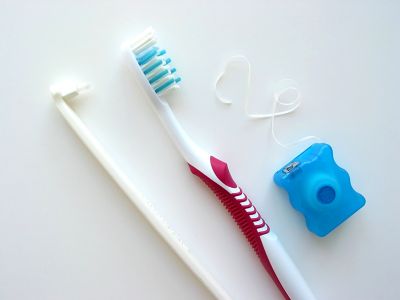
When it comes to oral hygiene dentists often recommend brushing and flossing, but is it really necessary to do both and which method is most effective at removing plaque and keeping oral disease at bay?
About brushing

Brushing the teeth involves using a toothbrush to clean the teeth and remove food debris and bacteria from the surfaces of the teeth. Brushing is really important because it removes existing debris and polishes the teeth to keep them feeling smooth and looking shiny and bright. If you neglect brushing, there is a very high risk of oral disease, as bacteria, saliva and bits of food combine to form plaque, a very potent substance, which is capable of clinging to the enamel, as well as the gum line. Plaque is the main cause of cavities and gum disease and brushing prevents its formation, which leaves you with a much lower risk of poor oral health. Gum disease can quickly lead to tooth loss without intervention. Dental implants are just one of the dental solutions to missing teeth.
Brushing also helps to prevent problems including bad breath and tooth discolouration and you only need to spend 2-3 minutes each morning and evening to enjoy the benefits. Dentists also recommend using fluoride toothpaste, as fluoride helps to strengthen the tooth enamel.
The ins and outs of flossing
Flossing is often recommended by dentists, but much less commonly carried out than brushing. Most people admit that they don’t take the time to floss. The benefit of flossing is that it covers areas of your mouth, which are not protected by brushing; this is because floss can reach areas that cannot be reached with a toothbrush. With dental floss, you can clean the gaps between the teeth and remove bacteria and bits of leftover food from the gum line, dramatically reducing the risk of plaque build-up.
Flossing can be a bit tricky to get the hang of, but if you do it every day, you’ll soon get used to it. If you have any problems, simply ask your dentist or dental hygienist for advice.
Which works better?
The advice from dentists would be to combine flossing and brushing, rather than going for one over the other and it’s not really a question of which works best, but when to use each method and how to use them both to clean the mouth to the best of your ability. Brushing is more effective in terms of whole mouth cleaning, but flossing plays an important role in covering areas that are often missed when you brush. Ideally, you should brush your teeth twice a day, for at least 2 minutes each time, as well as flossing on a daily basis.
Brushing and flossing tips
Here are some simple brushing and flossing tips to help keep dental troubles at bay:
- use a brush with a small head, as these are able to get right into the corners of the mouth
- consider investing in an electric toothbrush (it doesn’t have to be an expensive model), as studies show that they remove plaque more effectively than manual brushing
- angle your brush head so that you cover all the surfaces of the teeth
- use fluoride toothpaste
- brush for at least 2 minutes every morning and evening
- wait an hour to brush after eating
- never pull at dental floss, always be gentle
Hope this tips could help you.
